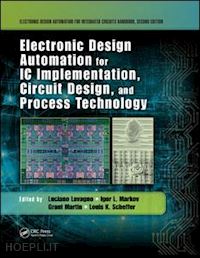Luciano Lavagno received his PhD in electrical engineering and computer sciences from the University of California, Berkeley, USA (UC Berkeley), in 1992, and from Politecnico di Torino, Italy, in 1993. He is a coauthor of two books on asynchronous circuit design, a book on hardware/software codesign of embedded systems, more than 200 scientific papers, and 12 US patents. Between 1993 and 2000, he was the architect of the POLIS project, a cooperation between UC Berkeley, Cadence Design Systems, Magneti Marelli, and Politecnico di Torino, which developed a complete hardware/software codesign environment for control-dominated embedded systems. Between 2003 and 2014, he was one of the creators and architects of the Cadence C-to-Silicon high-level synthesis system. Since 2011, he has been a full professor with Politecnico di Torino. He has been serving on the technical committees of several international conferences, workshops, and symposia. He has been the technical program chair of the Design Automation Conference, and the technical program committee and general chair of the International Conference on Hardware/Software Codesign and System Synthesis. He has been an associate editor of the Institute of Electrical and Electronics Engineers (IEEE) Transactions on Circuits and Systems and Association for Computing Machinery (ACM) Transactions on Embedded Computing. He is a senior member of the IEEE. His research interests include the synthesis of asynchronous low-power circuits, the concurrent design of mixed hardware and software embedded systems, the high-level synthesis of digital circuits, the design and optimization of hardware components and protocols for wireless sensor networks (WSNs), and design tools for WSNs. Igor L. Markov is currently on leave from the University of Michigan, Ann Arbor, USA, where he taught for many years. He joined Google in 2014 and occasionally teaches very-large-scale integration design at Stanford University, California, USA. He researches computers that make computers, including algorithms and optimization techniques for electronic design automation, secure hardware, and emerging technologies. He is an Institute of Electrical and Electronics Engineers (IEEE) fellow and an Association for Computing Machinery (ACM) distinguished scientist. He has coauthored five books, and has four U.S. patents and more than 200 refereed publications, some of which were honored by best-paper awards. Professor Markov is a recipient of the Design Automation Conference Fellowship, ACM Special Interest Group on Design Automation Outstanding New Faculty Award, National Science Foundation Faculty Early Career Development Program Award, IBM Partnership Award, Microsoft A. Richard Newton Breakthrough Research Award, and IEEE Council on Electronic Design Automation Early Career Award. During the 2011 redesign of the ACM Computing Classification System, Professor Markov led the effort on the hardware tree. Twelve doctoral dissertations were defended under his supervision; three of which received outstanding dissertation awards. Grant E. Martin is a distinguished engineer at Cadence Design Systems, Inc., San Jose, California, USA. Before that, Grant worked for Burroughs in Scotland for 6 years; Nortel/Bell-Northern Research in Canada for 10 years; Cadence Design Systems for 9 years, eventually becoming a fellow in their labs; and Tensilica for 9 years. He rejoined Cadence in 2013 when it acquired Tensilica, and has been there since, working in the Tensilica part of the Cadence Intellectual Property Group. He received his bachelor’s and master’s degrees in mathematics (combinatorics and optimization) from the University of Waterloo, Ontario, Canada, in 1977 and 1978. Grant has coauthored and coedited several books, including the first-ever book on system-on-chip (SoC) design published in Russian. He has also presented many papers, talks, and tutorials, and participated in panels at a number of major conferences. He cochaired the VSI Alliance Embedded Systems Study Group in the summer of 2001, and was cochair of the Design Automation Conference Technical Program Committee for Methods for 2005 and 2006. He is also a coeditor of the Springer Embedded Systems series. His particular areas of interest include system-level design, intellectual property-based design of SoC, platform-based design, digital signal processing, baseband and image processing, and embedded software. He is a senior member of the Institute of Electrical and Electronics Engineers. Louis K. Scheffer received his BS and MS from the California Institute of Technology, Pasadena, USA, in 1974 and 1975, and his PhD from Stanford University, California, USA, in 1984. He worked at Hewlett Packard from 1975 to 1981 as a chip designer and computer-aided design tool developer. In 1981, he joined Valid Logic Systems, where he did hardware design, developed a schematic editor, and built an integrated circuit layout, routing, and verification system. In 199











